The best (and worst) fats for your body
Protect your heart health—and much more—by choosing the right fatty foods.
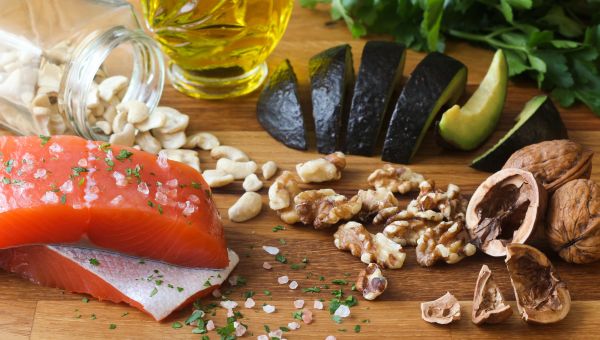
If you're looking to adopt a cholesterol-friendly diet, fat isn't a bad word, explains Marc Gillinov, MD, and Steven Nissen, MD, authors of Heart 411: The Only Guide to Heart Health You'll Ever Need (Three Rivers Press). "The idea that fat is bad for your heart is simply incorrect."
In fact, your body needs fat. What matters most is the type of fat you put on your plate.… Show More
If you're looking to adopt a cholesterol-friendly diet, fat isn't a bad word, explains Marc Gillinov, MD, and Steven Nissen, MD, authors of Heart 411: The Only Guide to Heart Health You'll Ever Need (Three Rivers Press). "The idea that fat is bad for your heart is simply incorrect."
In fact, your body needs fat. What matters most is the type of fat you put on your plate. Healthy fats—the unsaturated kind—can help lower your total cholesterol and "bad" low-density lipoprotein (LDL) cholesterol. They also help boost your "good" high-density lipoprotein (HDL) cholesterol levels.
Here's what you should know about fats, including which to avoid, the best kinds to enjoy and tasty ways to add good fats to your diet.
Show Less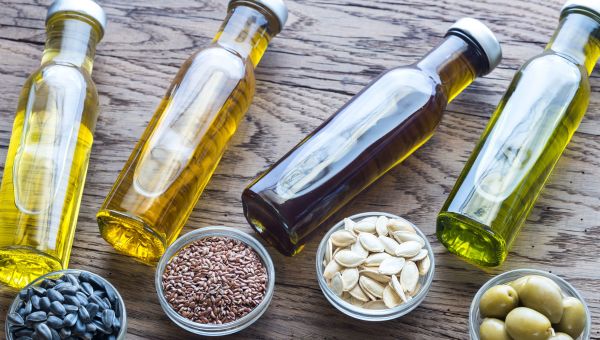
Good fat: Monounsaturated
Monounsaturated fats are the good guys—they help lower your total and LDL cholesterol levels, while boosting HDL cholesterol.
In one Canadian study, volunteers who replaced 13 percent of their daily carbohydrate intake with monounsaturated fats, like avocado and olive oil, lowered their LDL… Show More
Monounsaturated fats are the good guys—they help lower your total and LDL cholesterol levels, while boosting HDL cholesterol.
In one Canadian study, volunteers who replaced 13 percent of their daily carbohydrate intake with monounsaturated fats, like avocado and olive oil, lowered their LDL cholesterol by 35 percent in just 4 weeks. They also experienced a 12.5 percent improvement in HDL cholesterol during the same period.
The most recent Dietary Guidelines for Americans recommend adults consume between 30 and 45 grams of healthy oil, like olive oil and those found in fish and nuts, a day.
Show Less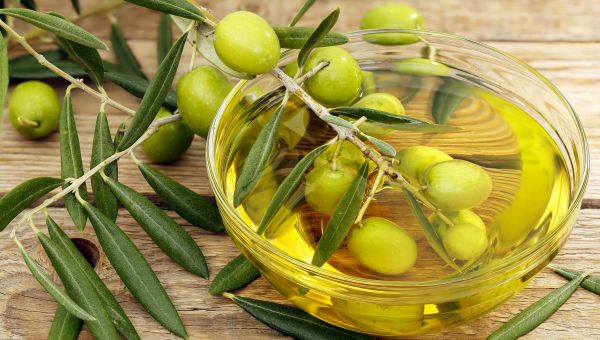
How to eat monounsaturated fat
Smart sources of monounsaturated fat include canola oil, nuts and nut oils, avocados and sesame oil. Olive oil, in particular, is great for your heart health.
"It's associated with decreases in triglyceride levels, inflammation and blood clotting, and better blood vessel function," Drs.… Show More
Smart sources of monounsaturated fat include canola oil, nuts and nut oils, avocados and sesame oil. Olive oil, in particular, is great for your heart health.
"It's associated with decreases in triglyceride levels, inflammation and blood clotting, and better blood vessel function," Drs. Gillinov and Nissen note. It may even increase HDL cholesterol, while lowering harmful LDL.
Not sure how to up your healthy fat intake? Add cubed avocado to your lunchtime salad or atop your morning omelet, dress your salad with olive oil or nosh on a handful of walnuts between meals.
Fats, even the good kind, are high in calories, so be mindful not to overdo it. Stick to:
- One-fourth of a medium avocado (80 calories)
- 1 ounce of walnuts (185 calories)
- 1 tablespoon of olive oil (120 calories)
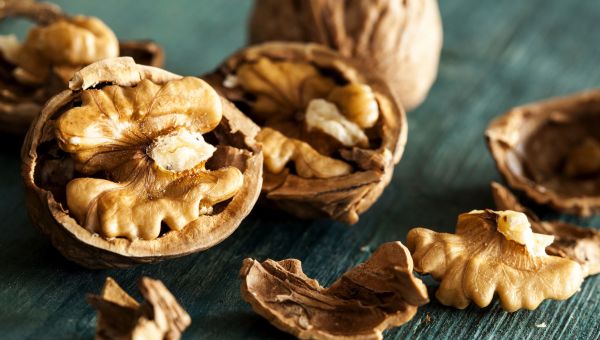
Good fat: Polyunsaturated
Polyunsaturated fats boast heart health benefits, too. This group of fats, which includes omega-3 and omega-6 fatty acids, helps manage your cholesterol levels and is essential for proper brain function and formation of the body's cells. Our bodies can't produce these fatty acids, so eating a diet… Show More
Polyunsaturated fats boast heart health benefits, too. This group of fats, which includes omega-3 and omega-6 fatty acids, helps manage your cholesterol levels and is essential for proper brain function and formation of the body's cells. Our bodies can't produce these fatty acids, so eating a diet rich in these nutrients is important.
Fatty fish, like sardines and salmon, are loaded with polyunsaturated fats, Gillinov and Nissen say. Walnuts, flaxseeds and canola oil are good sources of the nutrient, too.
Show Less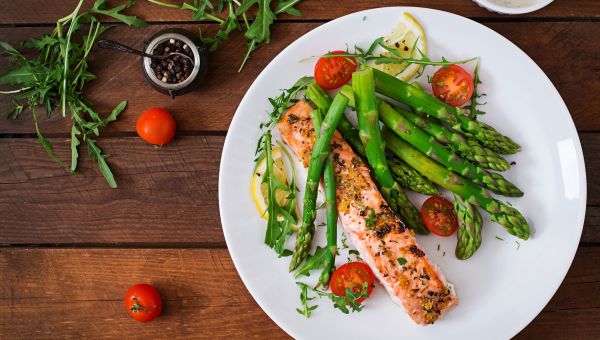
How to eat polyunsaturated fat
Fish are an outstanding source of polyunsaturated fats, say Gillinov and Nissen. Why? Coldwater fish, like salmon, sardines, halibut and tuna, are rich in two omega-3 fatty acids: eicosapentaenioc acid (EPA) and docosahexaenoic acid (DHA). EPA and DHA may help lower nasty triglycerides, raise… Show More
Fish are an outstanding source of polyunsaturated fats, say Gillinov and Nissen. Why? Coldwater fish, like salmon, sardines, halibut and tuna, are rich in two omega-3 fatty acids: eicosapentaenioc acid (EPA) and docosahexaenoic acid (DHA). EPA and DHA may help lower nasty triglycerides, raise HDL cholesterol, prevent blood clots, tame inflammation and make your blood vessels function better.
National guidelines recommend consuming about 8 ounces of fish each week. This simple recipe is a good place to start: choose a 3-ounce filet of your favorite fish, drizzle with fresh lemon juice, top with a sprinkle of crushed walnuts and bake until the fish is flaky and your nutty crust is golden and crispy.
Show Less
Bad fat: Saturated
Not all fats help lower your bad cholesterol levels. In fact, too much of some kinds, like saturated fats, can drive up artery-clogging LDL cholesterol. Saturated fats are found in foods like red meat, butter, full-fat dairy products, coconut oil, palm oil and shortening.
So, how much is too much?… Show More
Not all fats help lower your bad cholesterol levels. In fact, too much of some kinds, like saturated fats, can drive up artery-clogging LDL cholesterol. Saturated fats are found in foods like red meat, butter, full-fat dairy products, coconut oil, palm oil and shortening.
So, how much is too much? National guidelines recommend limiting saturated fat consumption to no more than 10 percent of your daily calories. The American Heart Association recommends consuming even less, between 5 and 6 percent of daily calories. That's 13 grams or 120 calories for someone eating a 2,000 calorie diet.
"Most Americans eat nearly twice this amount," Gillinov and Nissen say.
Show Less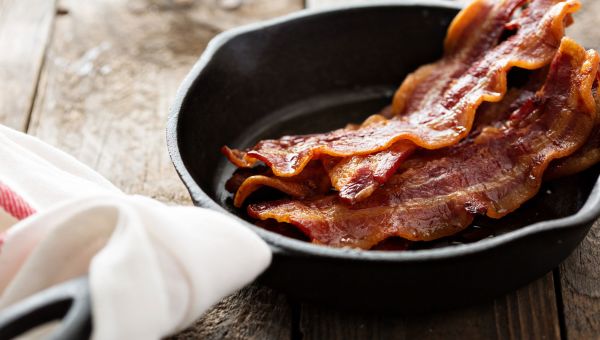
How to avoid saturated fat
Processed meats like bacon and pastrami are typically high in saturated fat and bad for your cholesterol levels. These products are also high in sodium—which can increase your blood pressure—and nitrates, which may alter your body's glucose tolerance and raise your risk of heart disease and… Show More
Processed meats like bacon and pastrami are typically high in saturated fat and bad for your cholesterol levels. These products are also high in sodium—which can increase your blood pressure—and nitrates, which may alter your body's glucose tolerance and raise your risk of heart disease and diabetes. In fact, eating the equivalent of just a few slices of deli meat or a hot dog a day is linked to a 42 percent higher risk of heart disease and a 19 percent greater risk of diabetes.
Enjoying the foods you love with less saturated fat is easy. Replace full-fat yogurt with a cup of plain nonfat Greek yogurt, or swap the deli meat on your lunchtime sandwich with canned tuna mashed with a bit of avocado.
Show Less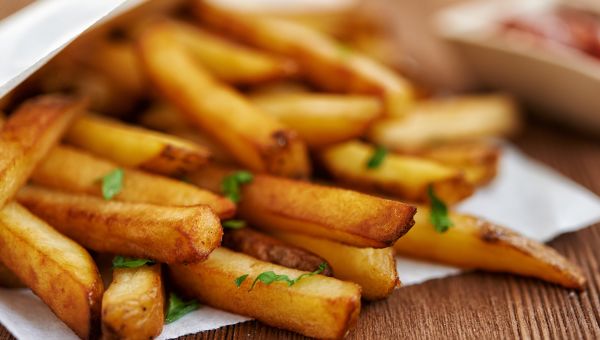
Worst fat: Trans fats
Trans fat is created when a liquid fat is infused with hydrogen. The new mix becomes solid at room temperature, so it has a long shelf life. That's why trans fats are found in processed foods—everything from commercial baked goods, stick margarine and shortening to run-of-the-mill fast food.
These… Show More
Trans fat is created when a liquid fat is infused with hydrogen. The new mix becomes solid at room temperature, so it has a long shelf life. That's why trans fats are found in processed foods—everything from commercial baked goods, stick margarine and shortening to run-of-the-mill fast food.
These unhealthy fats increase triglycerides, total cholesterol and LDL cholesterol, and decrease HDL cholesterol. "There's no safe quantity of trans fats," Gillinov and Nissen advise. "Our recommended intake is as close to zero as you can get."
The best way to ensure your diet is free of this bad-guy fat? Feast on whole foods, like fresh fruits and veggies, lean protein and whole grains, and avoid the prepackaged junk.
Show Less
Beware of "zero" trans fat
The US Food and Drug Administration (FDA) officially banned trans fats from processed foods in 2015, giving food manufacturers three years to comply with the new regulations. In the meantime, watch out for this catch: "Foods may be listed as 'zero trans fats' if they contain less than 500 mg of… Show More
The US Food and Drug Administration (FDA) officially banned trans fats from processed foods in 2015, giving food manufacturers three years to comply with the new regulations. In the meantime, watch out for this catch: "Foods may be listed as 'zero trans fats' if they contain less than 500 mg of trans fat per serving," Gillinov and Nissen warn.
Even that small quantity of trans fat might be bad for your heart. Their advice: Check the nutrition label. If a food's ingredient list includes "partially hydrogenated vegetable oils," you know it has trans fat, even if the Nutrition Facts claim otherwise.
Show LessMore On


video

article


video


video


video
